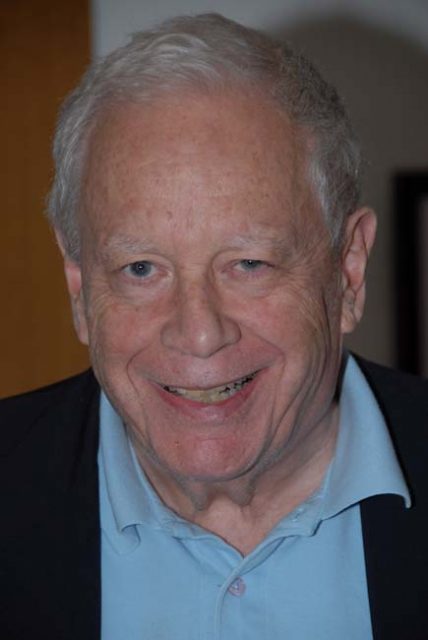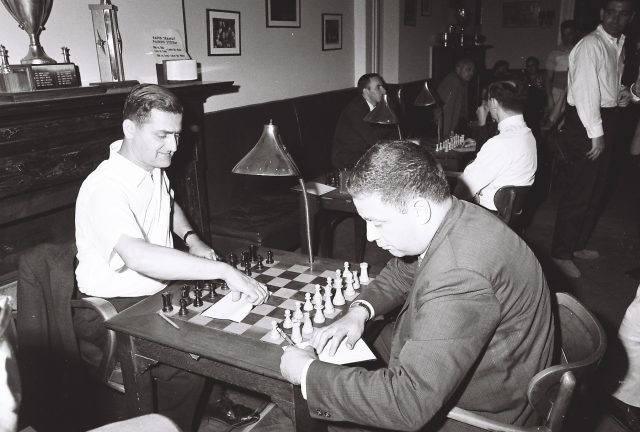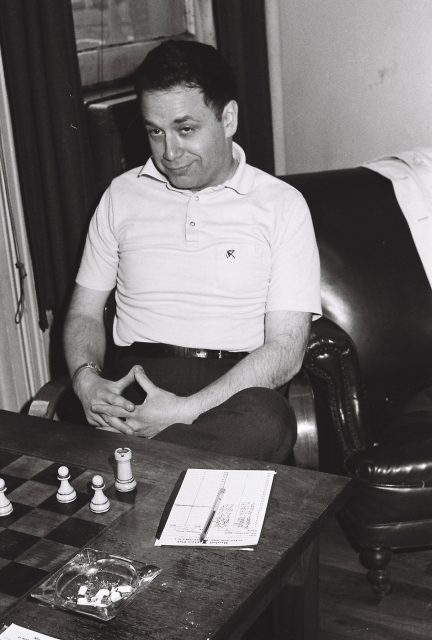 Walter Shipman at the Mechanics’ Institute Chess Club of San Francisco in 2009. (Photo Richard Shorman)
Walter Shipman at the Mechanics’ Institute Chess Club of San Francisco in 2009. (Photo Richard Shorman)American chess has suffered a great loss with the death of International Master Walter Shipman at the age of 87. Shipman, who died on February 28th in San Francisco, had been ill for some time. Walter Shipman was born in New York on April 18, 1929, and first received national attention when he finished near the top of the field in the 1946 U.S. Open. This was the debut not only for him, but a golden generation of players including Robert and Donald Byrne, Larry Evans and Arthur Bisguier, who would soon transform American chess. Unlike most of them Shipman never played professionally, despite being one of the top dozen players in the United States for most of the 1950s. He received his undergraduate degree from Columbia University and worked as a lawyer his entire professional life.
The Manhattan Chess Club was Shipman’s home base from the beginning of his career until he moved with his wife Mary to San Francisco in the mid-1990s. He first made a name for himself in the weekly blitz tournaments, and not long after became a fixture in its lineup in the Metropolitan team league, an important competition before the rise of weekend tournaments. Shipman also competed regularly in the championship of America’s strongest club winning it six times (1972, =1974, 1984, 1985, = 1994, 1995). Walter Shipman will be remembered as more than a player. His intelligence, wit, friendliness and sense of fair play will not be forgotten. Nor will his contributions away from the board. During the 1950s, before family life (his son Joe and daughter Judy are both accomplished tournament players) and career stepped in, Shipman was active as an administrator for the U.S. Chess Federation and the Manhattan Chess Club. It was in the latter capacity that he persuaded his fellow directors to make an exception and waive the age requirement to allow 12-year-old Bobby Fischer to join the M.C.C. in August 1955. Almost exactly two years later Fischer and Shipman would draw in the last round of the 1957 U.S. Open in Cleveland, the scene of Bobby’s first great triumph. Shipman would finish equal fourth, one of many high placings over the years in U.S. Opens – equal third in 1950 and tied for second forty-five years later!
 Walter Shipman and Louis Levy about to start play. James Sherwin and Paul Brandts are in the background with the black pieces. Circa 1966.
Walter Shipman and Louis Levy about to start play. James Sherwin and Paul Brandts are in the background with the black pieces. Circa 1966.The two would meet again in an invitational blitz tournament held in August 1971 at the Manhattan Chess Club to honor the club’s new quarters and Fischer’s 6-0 victories over Mark Taimanov and Bent Larsen. Bobby ran away with the event, scoring 21 ½ out of 22, drawing only Walter Shipman. The latter was winning that game but simply ran out of time against the super speedy Fischer. It was Shipman who perhaps best expressed what it was like to play Fischer as he got stronger and stronger; "It began to feel as though you were playing against chess itself." One American record that Shipman set that will be hard to beat, is that of the oldest player to become an International Master. Despite being of that strength for three prior decades, he did not formally receive the title until 1982 – there were simply no prior opportunities for earning the title for American players who weren’t willing to travel abroad. Few could match Shipman’s knowledge of American chess history, particularly that of the Manhattan Chess Club. Thanks to him a complete list of winners of the club’s annual championship dating back to 1883 is available, as is a record of the Manhattan’s many locations in its over one hundred year existence. Shipman was unfailingly generous in sharing information. Noted American chess historian John Hilbert, author of Shady Side: The Life and Crimes of Norman Tweed Whitaker Chess Master, wrote that when he approached Walter about his remembrances of Whitaker, Shipman not only provided it, but also asked many questions about the work in progress, helping to stimulate further research. Fair and objective were two words that accurately described Walter. When asking about a player from the past that Shipman personally knew, one could be sure they were getting the truth, the whole truth and nothing but the truth. A case in point is the late Abe Kupchik, who was inducted into the U.S. Chess Hall of Fame in 2014. The chapter on Kupchik in Arnold Denker and Larry Parr’s The Bobby Fischer I Knew is titled The Frightened, Little Rabbit and the conclusion of the former is that “Kupie” had a passive style and played as if he was afraid. Certainly Denker, who was known for his love of attacking play would not have found the games of Kupchik, generally remembered as a grinder par excellence, to be particularly interesting, but was he fair in his assessment? Shipman (who knew both men well) did not think so, believing “solid” a much accurate description of Kupchik’s playing style. He added that “Kupie”, in his opinion the second best American player after Marshall from roughly 1915 to the late 1920s, beat Denker in a very nice game in the 1936 US Championship and had a lifetime plus score against him.
 Walter Shipman circa 1965., (Photo Beth Cassidy)
Walter Shipman circa 1965., (Photo Beth Cassidy)This was not the only piece of unwritten American chess history that Shipman had tucked away. Everyone remembers the U.S. team did not attend Buenos Aires 1939 after winning the previous four Olympiads, but why not? The answer is not to be found in the pages of Chess Review or the American Chess Bulletin. Walter explained that George Emlen Roosevelt (yes, one of those Roosevelts), was willing to pay the travel for the U.S. team, but balked when the players asked for a modest honoraria to cover a month’s lost wages attending the event. Roosevelt, a banker and philanthropist who was one of the most prominent railroad financiers of his day, felt the players should be honored to play for the flag. The players, who had already demonstrated their patriotism countless times that decade, but had families to feed during the Depression, felt otherwise. Sadly, with Walter’s passing, much insider knowledge has been lost. Shipman was a player who went his own way in the opening. Long before its recent revival, he championed the Cozio Defense (1.e4 e5 2.Nf3 Nc6 3.Bb5 Nge7) to the Ruy Lopez and for many years opened 1.d4 Nf6 2.g3 as White. Like Kupchik, he was a fine positional player who picked up more than his share of points in the endgame, but also like “Kupie” he could attack quite vigorously when the situation called for it. A case in point is the following miniature played against fellow IM Kongliang “Ben” Deng at the 2004 American Open in Los Angeles. Walter was 75 when this game was played.
[pgn] [Event "American op 40th"] [Site "Los Angeles"] [Date "2004.11.28"] [Round "7"] [White "Shipman, Walter"] [Black "Deng, Kong Liang"] [Result "1-0"] [ECO "A80"] [WhiteElo "2247"] [BlackElo "2510"] [PlyCount "25"] [EventDate "2004.11.25"] [EventType "swiss"] [EventRounds "8"] [EventCountry "USA"] [Source "ChessBase"] [SourceDate "2008.11.26"] 1. d4 f5 2. Bg5 h6 3. Bh4 g5 4. e4 Rh7 {First played by Grzegorz Gajewski of Poland and later championed by fellow Grandmasterr Simon Williams of England, the text wins material at the cost of king safety.} 5. Qh5+ Rf7 6. Bxg5 hxg5 7. Nf3 fxe4 (7... Nf6 8. Qg6 Nxe4 $6 (8... e6 9. Nxg5 Qe7 10. e5 $1) 9. Ne5 Nd6 10. h4 $1 {favors White - Moskalenko.}) 8. Nxg5 Nh6 9. Nc3 c5 $2 (9... e6 10. d5 $1) 10. O-O-O cxd4 11. Rxd4 Qa5 12. Rd5 Qb6 13. Rf5 1-0[/pgn]
Walter Shipman will be missed by many.
Categories
Archives
- January 2026 (2)
- December 2025 (27)
- November 2025 (29)
- October 2025 (39)
- September 2025 (27)
- August 2025 (29)
- July 2025 (43)
- June 2025 (25)
- May 2025 (24)
- April 2025 (29)
- March 2025 (29)
- February 2025 (20)
- January 2025 (24)
- December 2024 (34)
- November 2024 (18)
- October 2024 (35)
- September 2024 (23)
- August 2024 (27)
- July 2024 (44)
- June 2024 (27)
- May 2024 (31)
- April 2024 (51)
- March 2024 (34)
- February 2024 (25)
- January 2024 (26)
- December 2023 (29)
- November 2023 (26)
- October 2023 (37)
- September 2023 (27)
- August 2023 (37)
- July 2023 (47)
- June 2023 (33)
- May 2023 (37)
- April 2023 (45)
- March 2023 (37)
- February 2023 (28)
- January 2023 (31)
- December 2022 (23)
- November 2022 (32)
- October 2022 (31)
- September 2022 (19)
- August 2022 (39)
- July 2022 (32)
- June 2022 (35)
- May 2022 (21)
- April 2022 (31)
- March 2022 (33)
- February 2022 (21)
- January 2022 (27)
- December 2021 (36)
- November 2021 (34)
- October 2021 (25)
- September 2021 (25)
- August 2021 (41)
- July 2021 (36)
- June 2021 (29)
- May 2021 (29)
- April 2021 (31)
- March 2021 (33)
- February 2021 (28)
- January 2021 (29)
- December 2020 (38)
- November 2020 (40)
- October 2020 (41)
- September 2020 (35)
- August 2020 (38)
- July 2020 (36)
- June 2020 (46)
- May 2020 (42)
- April 2020 (37)
- March 2020 (60)
- February 2020 (38)
- January 2020 (45)
- December 2019 (34)
- November 2019 (35)
- October 2019 (42)
- September 2019 (45)
- August 2019 (56)
- July 2019 (44)
- June 2019 (35)
- May 2019 (40)
- April 2019 (48)
- March 2019 (61)
- February 2019 (39)
- January 2019 (30)
- December 2018 (29)
- November 2018 (51)
- October 2018 (45)
- September 2018 (29)
- August 2018 (49)
- July 2018 (35)
- June 2018 (31)
- May 2018 (39)
- April 2018 (31)
- March 2018 (26)
- February 2018 (33)
- January 2018 (30)
- December 2017 (26)
- November 2017 (24)
- October 2017 (30)
- September 2017 (30)
- August 2017 (31)
- July 2017 (28)
- June 2017 (32)
- May 2017 (26)
- April 2017 (37)
- March 2017 (28)
- February 2017 (30)
- January 2017 (27)
- December 2016 (29)
- November 2016 (24)
- October 2016 (32)
- September 2016 (31)
- August 2016 (27)
- July 2016 (24)
- June 2016 (26)
- May 2016 (19)
- April 2016 (30)
- March 2016 (36)
- February 2016 (28)
- January 2016 (32)
- December 2015 (26)
- November 2015 (23)
- October 2015 (16)
- September 2015 (28)
- August 2015 (28)
- July 2015 (6)
- June 2015 (1)
- May 2015 (2)
- April 2015 (1)
- February 2015 (3)
- January 2015 (1)
- December 2014 (1)
- July 2010 (1)
- October 1991 (1)
- August 1989 (1)
- January 1988 (1)
- December 1983 (1)







